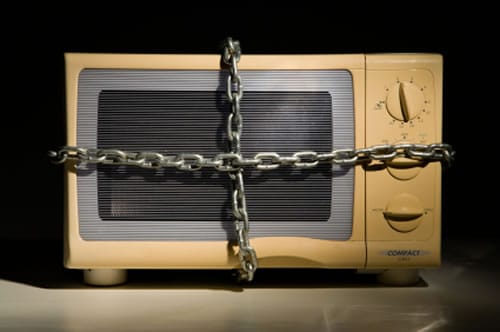Guy: In all honesty I haven’t used a microwave oven in years, and I get by very easily without one. It does bug me though when I want to heat up my wheat bag and put it on my aching muscles.
After our recent interview on EMF pollution, I’m much more cautious when it comes to anything that has a contentious dark side.
There are always two arguments when it comes to any topic like this, just like saturated fat vs low fat theory. Conventional wisdom says eat low fat for heart health yet I eat saturated fat for heart health. I do my homework, apply these practices and it works for me. My point is, I certainly encourage people to do their homework, with microwave ovens being no different.
Myself or Stu are no experts in microwave technology, but we don’t use them and here’s why. Should you use them? Up to you, but it’s always good to explore reasons for/against and go from there.
The microwave oven is an essential appliance in most modern kitchens, especially for people who do not cook. The use of microwave ovens has increased dramatically over the last 20 to 30 years, and most people in the Western world cannot imagine living without one.
Unfortunately, few people in recent generations have stopped and asked, “Are microwaves safe?” before heating that bag of popcorn or last night’s leftovers. Despite their widespread popularity, numerous studies show that the convenience of microwave ovens comes at a steep price: your health.
Microwave ovens are bad for your food
When shopping for groceries, most health-conscious people focus on the nutritional value of the foods they are buying and do not consider the extent to which nutrients are cooked out of food through exposure to heat. While conventional heating methods will also lower the nutritional value of most foods, microwaves cause far greater damage by ripping apart beneficial compounds at the molecular level as they bounce off the walls in order to cook your food. In particular, there is increasing evidence that microwaving foods denatures, or unfolds, proteins to a greater extent than conventional heating.
Microwave ovens are bad for you
When cell phone popularity first exploded in the late 1990s, doomsday prophets cautioned against the devices’ non-essential use due to their potential to cause brain cancer as a result of the head being repeatedly exposed to microwaves at close range. While this worry has largely died down in the years since cell phone use became mainstream (It’s still a grey area –see my thoughts here), there is still cause for concern about repeated exposure to radiation from microwave ovens.
Although most countries regulate radiation leakage from microwave ovens and require that manufacturers develop microwave ovens to specifications that take national safety standards into account, independent studies in the United States, Russia and elsewhere have determined that radiation leakage that falls below national limits is still enough to cause significant health problems. These include the formation of cataracts in people who stand within 20 inches (50 cm) of the viewing window as well as changes in heart rate and heart rate variability. Microwave ovens can also interfere with the electrical signalling in pacemakers, making them less reliable. For anyone with a pacemaker, the answer to the question, “Are microwaves safe?” is a resounding no.
Microwave ovens make your food bad for you
This point is somewhat obvious after reading the above if you also grew up hearing such classic nutrition advice as “you are what you eat” and “garbage in, garbage out.” Still, it is worth noting that the destruction of beneficial compounds in foods is not where microwave malfeasance ends. In addition to altering the nutritional value of your food, microwave ovens can change the chemical structure of beneficial compounds in ways that actually effect your health.
Recent studies have found that the amino acids in dairy products and grains are converted into carcinogenic substances and that carcinogenic compounds are formed in root vegetables when cooked in microwave ovens. Other health issues noted in people who regularly consume foods prepared or reheated in microwave ovens include increased cholesterol (because plant compounds providing a protective effect are destroyed) and decreased white blood cells, red blood cells and haemoglobin. When foods are heated or reheated in plastic containers, the heat produced by microwaves also causes BPA and other harmful chemicals to leach out of the plastic and into your food.
If you regularly use a microwave oven to reheat leftovers, it is worthwhile to examine your reasons for doing so and consider how you might get by without one. For the sake of your health and to fully reap the nutritional benefits of your healthy diet, it may be worth considering the move to conventional cooking practices.
Evidence based studies
Some excellent scientific data has been gathered regarding the detrimental effects of microwaves on the nutrients in your food and adverse effects on health.
Click here to read more on the research behind this.
Like I said at the beginning, you will always find information which is for and against. But I do think it’s a topic worth exploring if you use them…
Do you use microwave ovens? Love to hear your thoughts on this… Guy





